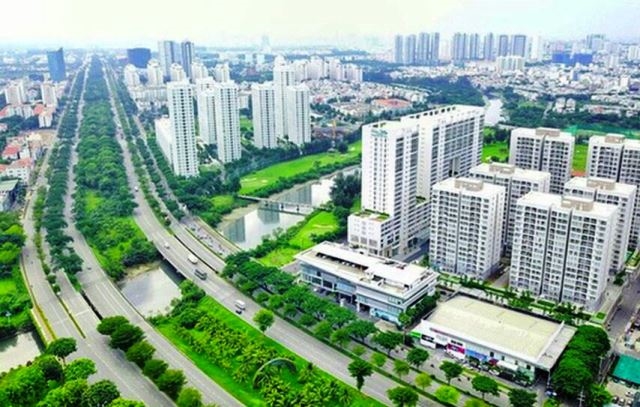(CPV) - The housing needs of middle-income and low-income earners, especially in large cities, are an urgent issue in Vietnam. In the context of rapid urbanization, rising real estate prices and scarce supply, it is difficult to satisfy the housing needs of all people; to address the housing needs, people need to have a clear financial plan, take advantage of support programs, and be flexible in choosing a place to live.
The 2013 Constitution affirmed that “Citizens have the right to have a legal residence” (Article 22), “Everyone has the right to own legal income, savings, housing…” (Article 32) and the State must “have a housing development policy, creating conditions for everyone to have a place to live” (Article 59). Therefore, over the past many years, our Party and State have paid great attention to taking care of housing for people, in both urban and rural areas, and have achieved important results contributing to the country’s socio -economic development.
However, the need to improve housing for the majority of people, who are middle-income and low-income earners, is still a difficult problem, especially in urban areas, when housing prices continue to increase in the context of increasingly scarce land funds, and supply cannot meet all of people's needs.
 |
| To address people's housing needs, close coordination between management agencies, businesses and the community is required to balance supply and demand (Photo: HNV) |
Current status and challenges in solving housing needs
Research data from the Vietnam Association of Realtors (VARS) shows that housing prices have grown by an average of double digits each year over the past decade. In particular, since 2018, when policies related to capital sources and decisions of agencies, departments and sectors in controlling the real estate market have caused a serious decline in housing supply while housing demand has continuously increased, causing real estate prices, especially in large cities such as Hanoi , Ho Chi Minh City and key economic development areas, to increase more strongly, far exceeding the growth rate of people's income. This makes owning a house from commercial housing supply more difficult than ever.
In that context, people with average and low incomes can only "look" to social housing (NƠXH). However, although the Government and the Prime Minister always closely monitor, direct and actively manage, many large cities are still limited in developing NƠXH. Due to lack of land fund, site clearance problems, cumbersome administrative procedures, it is difficult to attract investors. Therefore, for low-income workers, especially workers, teachers, or new office workers, saving to buy a house in urban areas has been, is and will continue to be a very distant goal. Because with the current real estate price level, even if house prices are halved, many people in the middle and low-income groups still have difficulty in buying a house. In reality, the prices of real estate products serving the actual needs of urban areas can only remain stable or decrease slightly for a certain period after a period of hot growth, and certainly cannot decrease deeply in the context of limited land funds, project development costs including construction materials, labor, especially land-related costs are increasing.
To bring people closer to their need for home ownership
VARS believes that to address people's housing needs, close coordination between management agencies, businesses and the community is required to balance supply and demand.
Firstly, on the supply side, solutions need to be aimed at increasing the supply of affordable housing, improving infrastructure in suburban areas, and developing effective financial support policies. The political system, all levels, sectors, especially localities, need to create conditions to provide maximum support for the development of affordable commercial housing and social housing to attract businesses to invest and develop housing projects.
On the demand side, people in need of housing in urban areas need to have a clear financial plan, take advantage of support programs, and be flexible in choosing where to live. Only then can the housing problem be effectively solved, bringing benefits to both individuals and society.
Specifically, by reducing unnecessary standards, expanding the search area and prioritizing solutions that fit current income, people can get closer to the goal of owning their first home. In the context of rapidly increasing real estate prices, adjusting expectations is an important step to realizing the dream of settling down. Instead of trying to buy a large, high-quality house with diverse, high-end services and utilities. People can balance to choose products with appropriate standards to harmonize between ability and desire. Only then can the goal of owning a new home become "easier".
Second, people need to be ready to expand their demand to the suburbs, where real estate prices are lower. With the trend of urban expansion to the suburbs, in the coming time, there will be more large-scale commercial housing projects and social housing developed, with lower selling prices but still ensuring good connectivity to the center thanks to transport infrastructure projects such as highways and metros expected to be invested and completed.
Third, to solve the housing needs, renting a house is a suitable temporary option. People can find apartments or boarding houses at reasonable costs in the suburbs or suburban areas, saving the remaining amount to prepare for buying a house. Spending no more than 1/3 of income on rent compared to having to spend up to 2/3 of income on mortgage repayment is a suitable financial solution to balance life.
Fourth, to own a house, people need to take advantage of support policies. People with savings, estimated at about 50% of the value, can choose to borrow to buy a house when they find a suitable product. Currently, there are many projects with flexible payment policies with long preferential periods and fixed interest rates, so that people do not need to "tighten their belts" to pay off debt.
VARS believes that the consensus and close, harmonious coordination of all three parties: the State, businesses and people, will create a closed development circle, solving the problem of people's housing needs effectively and sustainably.
Source: https://dangcongsan.vn/kinh-te/giai-bai-toan-cung-cau-nha-o-trong-boi-canh-hien-nay-686826.html





































































































Comment (0)